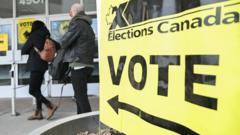Canadians are preparing to cast their votes in a crucial election, one that has been significantly influenced by U.S. President Donald Trump. Despite expectations that the Conservative Party would easily secure a victory, Trump's tariffs and comments about Canada becoming the "51st state" have profoundly altered the political landscape, invigorating Prime Minister Mark Carney's Liberal Party campaign. Recent polls indicate a slight lead for the Liberals, though Conservative leader Pierre Poilievre believes a win is within reach for his party.
The campaign concluded on a grim note following a tragic car ramming incident in Vancouver that resulted in 11 fatalities. In response, Carney canceled a scheduled event to address the nation, while Poilievre added an engagement in Mississauga to connect with the Filipino community affected by the tragedy.
Trump's decision to impose tariffs and his aggressive rhetoric has stirred patriotic sentiments among Canadians, which has been reflected in sports events where audiences showed disapproval towards U.S. national symbols. Many view this election as a chance to express their feelings towards Trump and assess Canada's foreign relations going forward.
Carney has emphasized the need to forge stronger ties with allies like the UK and EU, insisting that Canada's historic relationship with the U.S. is no longer applicable due to recent tensions. Poilievre positioned himself as a voice for change, highlighting frustrations with living costs and promising the Canadian populace a solution to their hardships.
Smaller parties like the New Democratic Party (NDP) have struggled to gain traction amidst the election's focus on larger parties. NDP leader Jagmeet Singh was visibly shaken by the recent violence in Vancouver, redirecting his campaign efforts toward community healing.
With traditional divisive lines between Liberal and Conservative parties resurfacing, Trump remains a notable figure, albeit not explicitly involved in the electoral campaigning. His administration has, however, maintained a stance suggesting Canada would benefit under American governance.
Polls opened today, and Canadians expressed increased interest in voting, evidenced by a record turnout with over 7 million early ballots cast. The election is expected to be closely contested as regions across the country weigh in on their political future and national identity amidst external pressures.



















